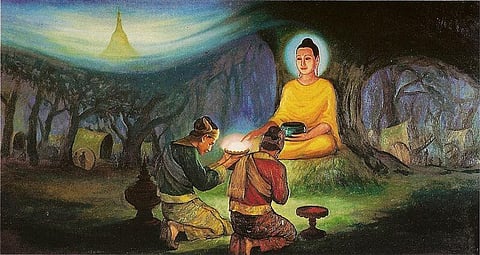
- Home
- न्यूजग्राम
- NewsGram USA
- India
- World
- Politics
- Entertainment
- Culture
- Lifestyle
- Economy
- Sports
- Sp. Coverage
- Misc.
- NewsGram Exclusive
- Jobs / Internships

August 14, 2016: Last year in December, 2015, a study was conducted by a team of 40 archaeologists and professors has found traces, that Lord Buddha might have lived 300 years earlier than researched. The discovery was led by the professors of archaeology and a pro-vice-chancellor of Durham University, England; that can perhaps reshape the very face of Buddhism.
The team found the remains of a wooden structure at Buddha's birthplace Lumbini, Nepal, that suggests Buddha's presence around the sixth century BC, mentioned the indiadivine.org in a report.
Follow NewsGram on Facebook
After researching for more than 3 years at Lumbini's Maya Devi Temple, the researchers have discovered a shrine which indicates all known Buddhist traces to be as old as 300 years or more. The ancient shrine that was found during the research, was made of timber at the Maya Devi Temple in southern Nepal, that has clues of Buddha's birth. Legend has it, that Lord Buddha's mother, Maya Devi, was on her way from her husband's kingdom to her parents' home and in the midway, she gave birth to Buddha, mentioned indiadivine.org.
The project was led by Robin Conginham and was supported by National Geographic Channel. It is a blend of tradition, science, belief and archaeology, believes Conginham. But most of what Buddhism constitutes is only oral tradition and legends, and little or no evidence that can state the existence of Lord Buddha. The estimated era of the emergence of Buddhism is more ancient than previously thought because the 6th century BC was the emergence of the middle class, coin system, kinship and ancient urbanisation. As a result, it can be easily believed that this was the time when Gautam Buddha emerged as a preacher who discarded materialistic pleasures such as wealth. Early studies on Buddhism were based on textual remains and oral narratives, which also involved the politics of transmission- where the storytellers modified the stories too.
The estimated era of the emergence of Buddhism is more ancient than previously thought because the 6th century BC was the emergence of the middle class, coin system, kinship and ancient urbanisation. As a result, it can be easily believed that this was the time when Gautam Buddha emerged as a preacher who discarded materialistic pleasures such as wealth. Early studies on Buddhism were based on textual remains and oral narratives, which also involved the politics of transmission- where the storytellers modified the stories too.
Follow NewsGram on Twitter
Buddhism is an all-religion tolerant belief or 'dharma' that is increasingly gaining popularity all over the modern world. It preaches awakening of the mind and the soul, compassion, and impermanence of wealth and tracing Buddha's life will have a great impact on his teachings. It is a known fact that his birthplace 'Lumbini' was discovered but not maintained after being found; therefore, it turned into a jungle before it was rediscovered in 1896 and now it falls under UNESCO World Heritage Site.
In a statement, Irina Bokova, Director General, UNESCO, threw light on the plans to increase tourist attraction in Lumbini by "more archaeological research, intensified conservation work and strengthened site management."
The next research by Conginham on Buddhism is likely to be Buddha's childhood places, funded by UNESCO and supported by the Japanese government.
– prepared by Chetna Karnani, at NewsGram. Twitter: @karnani_chetna
ALSO READ:
